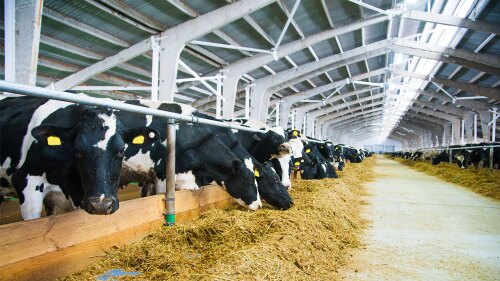The threat of Avian Influenza
Avian Influenza viruses occur naturally among wild aquatic birds worldwide and can be spread to domestic poultry. Wild aquatic birds that may spread the viruses include ducks, geese, swans, gulls, terns, and shorebirds. The viruses spread through saliva, nasal secretions, and feces. Humans and animals who come in contact with Avian Influenza viruses or contaminated surfaces can catch the viruses.
This virus can lead to significant health issues in both humans and animals. Birds infected with the virus are at high risk of morbidity and mortality. Dairy cattle are likely to recover with little to no mortality when given supportive treatment. Identifying signs of Avian Influenza early and isolating the infection not only prevents it from spreading within your farm, but also surrounding farms and nearby wildlife. The faster you catch the viruses, the sooner you can start treatment.
Potential signs of Avian Influenza
Birds
Early detection in birds is important to stop the virus from spreading. According to the American Veterinary Medical Association, infected poultry may show one or more of the following signs:
- Sudden death with no prior signs
- Low energy or appetite
- Purple discoloration or swelling of various body parts
- Reduced egg production, or soft-shelled/misshapen eggs
- Nasal discharge, coughing, or sneezing
- Lack of coordination
- Diarrhea
Cattle
- Low appetite
- Reduced milk production
- Abnormal appearance of milk (thickened or discolored)
- Abnormal feces
- Fever
- Eye redness
Humans
- Eye redness
- Fever
- Cough
- Sore throat
- Runny or stuff nose
- Muscle or body aches, headaches
- Fatigue or shortness of breath, difficulty breathing
Avoid letting bird flu into your barn
The CDC recommends the following steps to prevent and reduce spreading Avian Influenza in humans, birds, and cattle:
- Avoid close, long, or unprotected exposures to sick or dead animals, and avoid unprotected exposures to animal poop, bedding (litter), unpasteurized (“raw”) milk, or materials that have been in close proximity to animals with suspected or confirmed A(H5N1) virus.
- Use personal protective equipment such as gloves, safety goggles or face shield, rubber boots, head cover, fluid resistant coveralls or apron, and a proper particulate respirator.
- Regularly clean and disinfect surfaces, water sources, and bedding surrounding farm animals. Wear clean clothing when coming in contact with healthy farm animals and change clothing after handling infected or potentially infected animals.
- Monitor animals for any unusual, flu-like symptoms. If you suspect an outbreak, isolate the affected animals immediately and contact your veterinarian to perform diagnostic tests and confirm the presence of the virus.
- Educate employees on symptoms of the viruses and monitor those in direct or close contact with infected animals. Encourage employees to seek medical attention and testing if they suspect they have one of the viruses.
For more detailed guidelines and updates, you can visit the CDC’s avian influenza page.
Biosecurity measures
Establishing a strong herd health plan with input from your veterinarian can be vital to protecting your farm. According to Healthy Farms Healthy Agriculture (HFHA) follow these biosecurity measures for stronger farm safety.
- Observe all animals at least once daily for signs of disease, including lameness, loss of appetite, salivation, lethargy, or sudden death.
- Thoroughly clean equipment such as livestock trucks and trailers, manure loaders and spreaders, tractors, portable livestock chutes, and other fomites that could easily spread disease from one site to another.
- Assign employees to their respective work areas. Train employees on good animal handling techniques and how the movement of manure (on clothing, equipment, animals, etc.) is one of the biggest biosecurity risks for on farm movement of diseases.
- Restrict outside vehicles to drive across cow lanes or lanes used for feed and manure handling equipment. Do not share vehicles, trailers, or equipment with other farms without cleaning and disinfecting between uses.
- Clean and dispose of feed spills around storage bins and feed tanks to avoid attracting wild birds or rodents. Completely clean out all feed storage areas between shipments.
Sources:






